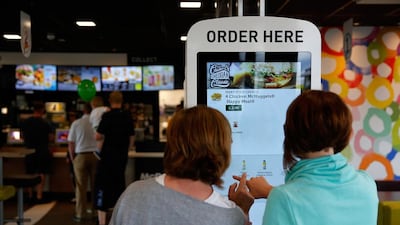A few months ago, I popped into the local McDonald’s and had the strangest experience. The restaurant had just installed touchscreen ordering kiosks. As a fan of all manner of gadgets, I made a beeline for one and used it to punch in my lunch.
The screen pumped out a receipt and instructed me to sit down at a table, taking one of those disc-shaped devices that buzzes when your order is ready. It vibrated a few minutes later, at which point a friendly employee cheerfully delivered my food.
She checked on me a few minutes later to see how I was doing. We chatted about the weather, our respective jobs and, surprisingly, the latest technological developments in fast food. I wondered if I had accidentally wandered into the wrong restaurant.
I frequent McDonald’s every once in a while, usually by myself and often when in a hurry. Apart from placing an order with a cashier, I don’t think I’ve ever actually spoken with anyone there. So this experience was, like I said, strange – but also strangely pleasant.
It came to mind last week after seeing some of the reactions to Amazon’s US$13.7 billion purchase of the Texas-based Whole Foods, an upscale grocery store chain that has more than 430 locations in North America and the United Kingdom.
The deal is notable for many reasons, not the least of which is that it represents the online company getting into bricks-and-mortar retailing in a big way. But of particular note in this case are the worries about how it will affect the 91,000 people currently employed by Whole Foods.
The chain is renowned for the personal interactions customers get at its stores. Staff are upbeat, friendly and helpful, the sort of thing of that McDonald’s is now evidently striving for.
But, as with anything Amazon touches, the fear is this will change – that the technology giant will eliminate human workers with impersonal automation. This is a company, after all, that last year opened a completely automated grocery outlet in Seattle where shoppers are automatically billed after sensors detect what they leave the store with.
One 52-year-old Whole Foods customer, who doesn't shop online, summed up the automation fears to The Washington Post. "I like to come in and see people," he said. "The cashiers know me as a regular."
There are legitimate worries when it comes to Amazon – its growing ability to monopolise entire industries is one – but killing jobs or dehumanising the shopping experience shouldn’t be among them.
Amazon told the Post (which the Amazon chief Jeff Bezos owns) it has no plans for automation, and even if jobs are cut, a restructuring could involve new hiring elsewhere within the operation.
That last part is key given the tendency by some academics, economists and media to view automation and technology in general as veritable job Terminators, when in fact they do something quite different. By disrupting, they make jobs – and customer experiences – better.
The fate of the camera pioneer Kodak, for instance, has been cited as an example of the internet’s destructiveness. At its height, Kodak was worth US$28 billion and had 140,000 employees, but its supposed disrupter – Instagram – employed only 13 people when it was bought by Facebook in 2012.
The auto industry is another good example. In 1990, when they had a combined $250bn in revenue, the top three US manufacturers employed 1.2 million people. In comparison, the top three tech firms employed only 137,000 when they achieved similar revenue in 2014.
In both cases, the inference is that a few people at the top get richer, but the middle class loses out in terms of jobs and experience.
The reality, however, is quite the opposite.
Mobile app developers, for example, didn’t exist just a few short years ago, yet there was an estimated 14 million of them globally last year and their average salary was $97,000.
It’s an open question what Amazon will do with Whole Foods, but the chances are good that it will act to change the grocery business. It may even cause jobs to be lost.
But, as the McDonald’s example illustrates – and as Amazon itself suggests – new jobs are likely to arise as personnel are redeployed into different roles.
For its part, McDonald’s is consciously shifting employees away from robotic cashier positions and toward more interactive responsibilities, a move that arguably creates better experiences for everyone involved.
Whole Foods already understands that dichotomy, which means its customers and employees – and the grocery industry by proxy – can only stand to gain from any changes that Amazon implements.
I wouldn’t be too worried about Amazon’s entry into the grocery business. I suspect it’s going to improve the experience for both employees and customers.
I’d bet my Big Mac on it.
Peter Nowak is a veteran technology writer and the author of Humans 3.0: The Upgrading of the Species

